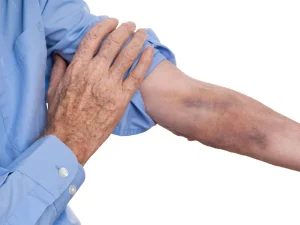
If you had a parent who was frequently enraged while drunk, you may expect that response in yourself when drinking and therefore exhibit it. Using a personality questionnaire, an aggression scale, and alcohol use and history assessments, researchers compared 156 people without the gene with 14 people who have it. Researchers were studying people in the Finnish population, of which more alcoholic rage syndrome than 100,000 people have the genetic variation. In rodent studies, glutamine is linked to heightened agitation and aggression during alcohol withdrawal (7). Additionally, repeated drinking may alter GABA receptors and even damage cells, causing reduced sensitivity to the body’s own relaxing neurotransmitter (8). Studies have shown that serotonin levels may begin decreasing within 30 minutes of that first drink (4).

How does alcohol consumption lead to changes in behavior?
Binge drinking in a setting with others who are also intoxicated can lead to competitive or confrontational situations. Peer pressure and social norms can sometimes encourage aggressive behavior. Alcohol can cause changes in the brain and behavior, leading to aggression. It affects cognitive functions and emotional regulation and is influenced by psychological and social factors. Talk to a healthcare provider when you are considering quitting if you have a long history of heavy drinking Sober living house or alcohol use disorder.
De-escalation Strategies

In a rage, he tore through their apartment until he found her on the bed. Without even blinking an eye, he was soon screaming at her and choking her. It was only when she hit him on the face trying to get free that he came to himself and realized with horror that he was completely out of control.
Why You Should Not Treat Anxiety With Alcohol
- Understanding your emotions and making smart decisions about alcohol consumption is the best way to avoid problems.
- Learning to manage your anger before you start drinking is essential.
- This amplification occurs due to alcohol’s impact on the brain’s neural pathways, particularly those involved in emotional regulation.
- The key is to discover fulfilling ways to relax, socialize, and cope with stress that don’t involve alcohol.
When drinking alcohol, the brain can’t regulate emotions as efficiently, leading to mood swings and aggressive behavior. Alcohol-related anger and aggressive behaviors increase the chance of developing common mental health conditions, including depression, anxiety, and stress. Moreover, alcohol can increase the risk of bipolar disorder, dementia, mood disorders, and schizophrenia. However, as alcohol consumption increases, it begins to impact other neurotransmitters, particularly serotonin and dopamine. Serotonin plays a crucial role in mood regulation and impulse control. When alcohol disrupts the delicate balance of serotonin in the brain, it can lead to increased aggression and impulsivity.
Various factors affect the potential for anger arousal with alcohol consumption.
Researchers found those who use alcohol to cope with anxiety have greater chances of becoming dependent, misusing alcohol, or developing alcohol use disorder. As the alcohol is metabolized and wears off, your brain works to restore chemical balance. It lowers levels of GABA—making you feel less calm—and boosts glutamate, which increases anxiety. Acetaldehyde contributes to inflammation in the liver, pancreas, intestinal tract, and brain, among other organs. As a result, people feel malaise (a general feeling of unwellness), fatigue, headache, and other physical symptoms. When Timothy hit his early 40s, not only was he having a beer or two at the end of the day, but often an entire six pack would disappear in the evening.
What are the strategies to prevent or manage episodes of anger when intoxicated?
- Among the many studied physiological and behavioral effects of alcohol is disinhibition, or reduced control over impulses or urges after intoxication.
- It’s easy to disregard tough emotions in the moment if you know you can “take the edge off” once you have a drink in your hand.
- Instead of being a natural emotion, someone with an alcohol use disorder (AUD) will express anger to avoid dealing with unpleasant or adverse circumstances, including the addiction.
Alcohol withdrawal can cause severe and sometimes life-threatening symptoms. When people have anxiety, drinking alcohol might seem like an effective way to cope. And though the immediate effects might lessen some of the worry or dread you feel, this change is short-term, and the long-term consequences can make matters worse. If you or someone you know is having problems with anger issues combined with alcohol use, we may be able to help. Our team can teach you or your friend about stress and anger management techniques, improve your communication skills and uncover the underlying reasons for your inappropriately expressed anger. As you can see from Timothy’s story, when drinking and anger cross paths, one’s behaviour can quickly get out of control without our even realizing the path that we are on.

Psychological Signs of Addiction: Recognizing the Mental Health Impact of…
We offer each caller a personalised service to help you to make an informed choice about counselling. Part of our service is to take the time to answer your important questions and to help you decide on the practitioner who is best suited to your needs. Confidant Health is an online platform that provides licensed professionals to help you resolve alcohol-related aggressiveness through MAT. Support groups such as Alcoholics Anonymous (AA) and Self-Management And Recovery Training (SMART) are open to anyone with a substance use disorder. Disulfiram (Antabuse), acamprosate (Campral), and naltrexone are the most common medications used to treat AUD. PHPs accept new patients, and people who have completed an inpatient program and require additional intensive treatment.